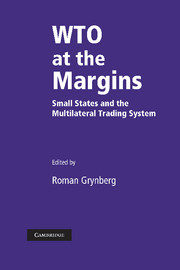Book contents
- Frontmatter
- Contents
- List of figures and appendices
- List of tables
- List of contributors
- Introduction
- Part I Theory and evidence
- Part II WTO and small economies
- Part III WTO dispute settlement
- 11 Small states in the banana dispute
- 12 Impact of changes in the European Union's policy for banana imports on the Eastern Caribbean Region (1992–2002)
- 13 Jamaica and the case in the WTO against the European Communities regime for the importation, sale and distribution of bananas (1992–2001)
- 14 WTO complaints by Australia and Brazil regarding the EU sugar regime
- 15 Reform of EU export subsidies on sugar: the legal and economic implications for the ACP countries
- 16 Analysis of the impact of opening up the EU import market for canned tuna on ACP countries
- Part IV Negotiating issues and institutional arrangements
- Index
11 - Small states in the banana dispute
Published online by Cambridge University Press: 05 May 2010
- Frontmatter
- Contents
- List of figures and appendices
- List of tables
- List of contributors
- Introduction
- Part I Theory and evidence
- Part II WTO and small economies
- Part III WTO dispute settlement
- 11 Small states in the banana dispute
- 12 Impact of changes in the European Union's policy for banana imports on the Eastern Caribbean Region (1992–2002)
- 13 Jamaica and the case in the WTO against the European Communities regime for the importation, sale and distribution of bananas (1992–2001)
- 14 WTO complaints by Australia and Brazil regarding the EU sugar regime
- 15 Reform of EU export subsidies on sugar: the legal and economic implications for the ACP countries
- 16 Analysis of the impact of opening up the EU import market for canned tuna on ACP countries
- Part IV Negotiating issues and institutional arrangements
- Index
Summary
Introduction
The high-profile and long-running transatlantic dispute over the European Union's banana import regime was widely perceived as a straightforward fracas between the EU on the one hand and the US and Latin American exporters on the other. In reality however, it involved a diverse mix of participants, including some of the world's smallest states, which had a decisive bearing on the evolution of the regime. Among the most determined and active were Caribbean exporters, led by the tiny Windward Islands. This study examines their performance, the implications for them of the outcome of the dispute and the lessons to be learnt, amongst the most intriguing of which is that their size does not automatically preclude small states from actually being more than passive onlookers in the processes of international decision-making that determine their future.
What was the dispute?
The trigger that precipitated the ‘banana war’ was the approach to the unification of the European Communities markets from 1 January 1993. Prior to this, the various Member States had operated their own import arrangements for bananas, in some cases applying a variety of tariff and quota restrictions. At one extreme was Germany with no import restrictions and at the other Spain, which effectively reserved its entire domestic market for bananas from the Canary Islands. Between these extremes were the range of import systems operated by the individual Member States. France maintained import duty and a virtual ban on bananas from Latin America though it provided import quotas for the bananas from francophone exporters in Africa.
- Type
- Chapter
- Information
- WTO at the MarginsSmall States and the Multilateral Trading System, pp. 425 - 450Publisher: Cambridge University PressPrint publication year: 2006
- 1
- Cited by



